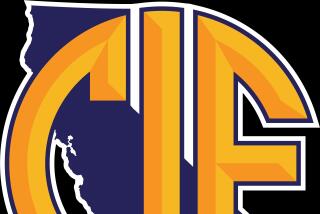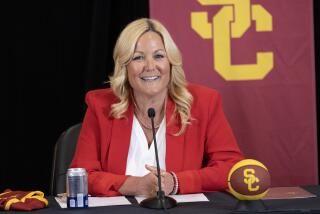Kansas Athletic Director Calls for Move to Parity
CHANUTE, Kan. — The Kansas athletic director says a move toward parity is needed if college athletics are to continue at their present pace.
“I would hope that in the next five years there are going to be some drastic changes in intercollegiate athletics,” Bob Frederick told a group of Rotarians in Chanute Thursday. “If there aren’t, I think we’re going to self-destruct and there won’t be intercollegiate athletics as we know it today.”
Frederick said changes are imminent over the next few years if intercollegiate athletics are to maintain their standing at colleges and universities across the country.
“One, I think we’ll drastically cut back on our expenditures, and two, I think we’ll find the NCAA to be much more protective of student athletes,” he said.
“Hopefully, we’ll get it back closer to the way that it used to be, that young men and women come to school to get an education and if they’re talented enough to participate in athletics, than they’ll have that opportunity to do so,” Frederick continued.
Changes are necessary, Frederick said, because of the widening gap between the top 25 football teams and the remaining 81 in NCAA Division I competition.
The top programs are getting most of the money from TV revenue, bowl appearances and season-ticket revenue while other programs slip further behind without funds to purchase facilities and equipment to attract top players to strengthen their programs, he said.
Frederick said KU has had a continuing decrease in funds from the Big Eight Conference, which divides most of the bowl, television and NCAA basketball tournament money generated by all eight teams in the conference. Three year’s ago, KU’s equal cut was $1.6 million. Last year it dwindled to $1.4 million, the same as this year. Next year, it is projected to be reduced to $900,000, due largely to Oklahoma and Oklahoma State being placed on probation and banned from bowl competition.
The annual sports budget at Kansas is $8 million, and such a substantial decrease in revenues will be difficult to overcome, Frederick said. “Nebraska can raise football ticket prices two dollars and get its money back. If we raise prices two dollars, we’ll lose 800 (season-ticket) holders,” he said.
More to Read
Go beyond the scoreboard
Get the latest on L.A.'s teams in the daily Sports Report newsletter.
You may occasionally receive promotional content from the Los Angeles Times.










